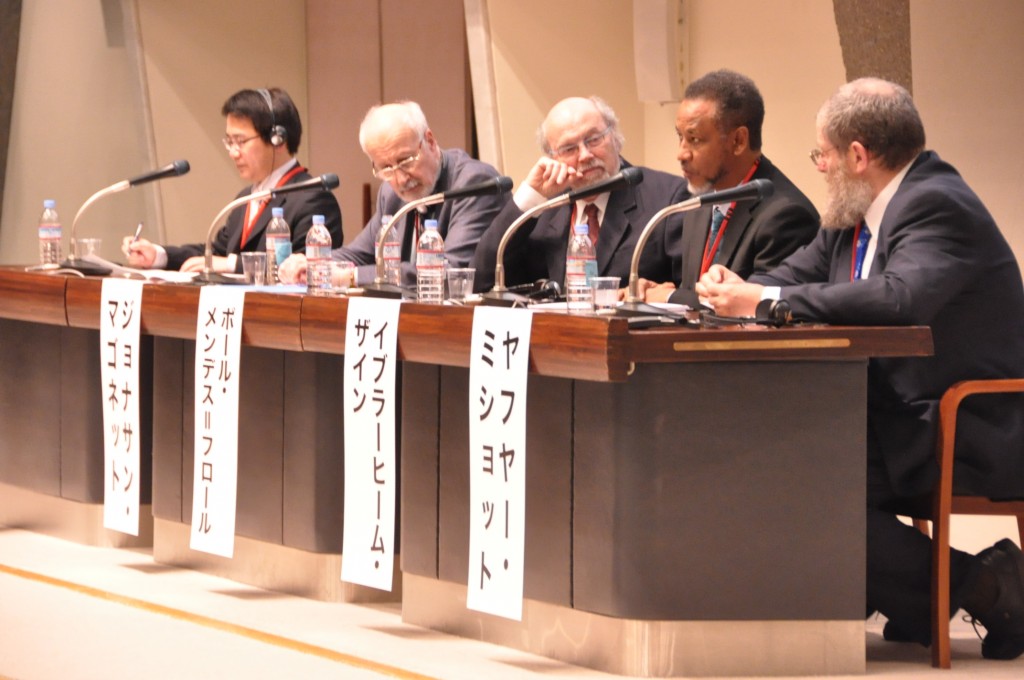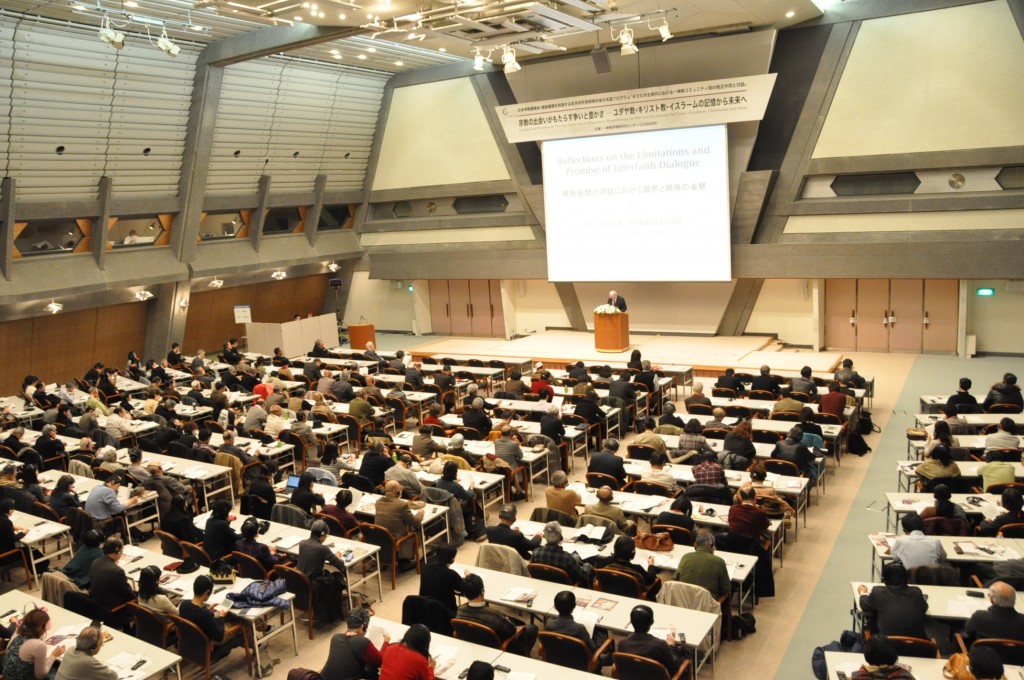Center for Interdisciplinary Study of Monotheistic Religions(CISMOR)Doshisha University
> Public Lectures > Conflicts and Enrichment Through Interreligious Encounters: Remembering the Past and Envisioning the Future of Judaism, Christianity and IslamPublic Lectures
International Symposium
Conflicts and Enrichment Through Interreligious Encounters: Remembering the Past and Envisioning the Future of Judaism, Christianity and Islam
| Date: |
2012/02/18 13:00− 15:30 |
|---|---|
| Place: |
Kyoto International Conference Center |
| Lecture: |
― Dr. Yahya M. Michot, Professor of Duncan Black Macdonald Center, Hartford Seminary ― Dr. Jonathan Magonet, Emeritus Professor of Leo Baeck College ― Dr. Paul R. Mendes-Flohr,Emeritus Professor of The Hebrew University of Jerusalem ― Dr. Ibrahim M. Zein, Professor of International Islamic University Malaysia |
| Summary: | |
|
【Program】 ◆Keynote Speeches by our guest speakers Dr. Yahya M. Michot Dr. Jonathan Magonet Dr. Paul R. Mendes-Flohr Dr. Ibrahim M. Zein ◆Panel Discussion Dr. Yahya M. Michot, Dr. Jonathan Magonet, Dr. Paul R. Mendes-Flohr and Dr. Ibrahim M. Zein Moderated by Katsuhiro Kohara, Director of CISMOR, Doshisha University This symposium was held in commemoration of the acceptance of CISMOR’s research project, Interrelations and Dialogue among the Communities of Monotheistic Religions in the Multicultural Age, by the Japan Society for the Promotion of Science as its “Strategic Young Researcher Overseas Visits Program for Accelerating Brain Circulation,” which is designed to send young researchers to overseas research institutes to promote international joint research activities. For the symposium, lecturers were invited from CISMOR’s overseas partner research institutes. The symposium began with lectures by: Dr. Jonathan Magonet, emeritus professor of Leo Baeck College; Dr. Paul R. Mendes-Flohr, emeritus professor of the Hebrew University of Jerusalem; Dr. Ibrahim M. Zein, professor of International Islamic University Malaysia; and Dr. Yahya M. Michot, professor of Duncan Black Macdonald Center, Hartford Seminary. The summary of each lecture is shown below. Dr. Jonathan Magonet The first lecturer, Dr. Magonet, spoke about the diversity in opinions about “coexistence” and the importance of interreligious dialogue for today’s society. Since the 19th century, the Jewish people have been likely to consider their tragic experience in modern Europe as contrasting with the Jewish experience in Spain under Islamic rule, where Islam, Judaism, and Christianity are said to have coexisted peacefully. However, recent research has revealed that it is more proper to say that these three monotheistic religions maintained mutually beneficial relationships on multiple levels in Islamic Spain, rather than that they coexisted in harmony. The interactions among these three religions should be examined not only in light of their respective doctrines, but also based on an understanding of the legal, social, political, and cultural aspects of those days, and, above all, the nature of the Islamic imperial rule behind them. Opinions about coexistence can vary with the change of political forces. In general, the idea of coexistence is accepted favorably in today’s society. However, this idea can be negatively taken in some circumstances. In fact, a negative opinion on coexistence is now prevailing in certain contexts, affected by bitter political realities (such as the emergence of Islamism) and various other political forces. In addition, these three religions are constantly under pressure to redefine their identities and doctrines in secularized Western society, which has led to the emergence of conflict between modernists and fundamentalists within the same religion. On the other hand, awareness has been increasing on the similarities of these religions. Universal values can transcend religious differences. The three monotheistic religions should respect one another, accept the differences among them, and share their interest in economic and environmental issues, social justice, and political conditions to achieve peaceful coexistence. Interreligious dialogue can play a role in achieving this goal. Dr. Paul R. Mendes-Flohr Next, Dr. Mendes-Flohr spoke about the change in opinions regarding “tolerance” and indicated a clue that could lead us to tolerance in a true sense. He stated that before the 18th century, the French equivalent of the English word “tolerance” meant “acceptance of evil,” and thus had a negative nuance. It is only after the establishment of modern states and secular social systems that the idea of tolerance was accepted as part of civil ethics. Modern liberal thinkers argued that to achieve tolerance, Christians and Muslims should be indifferent to each other. In doing so, these thinkers posed a challenging question to monotheistic religions—they asked whether monotheistic religions could be tolerant to one another without making compromise in their faiths. We may get closer to tolerance if we accept the relativity of religious faiths. Today, this notion is supported by some thinkers who maintain that all religions are the same in nature and that their differences are of little importance. However, such a relativistic view of tolerance is not part of a theological virtue. True tolerance should be based on mutual respect for and an understanding of the beliefs and characteristics of other religions. A clue that may lead us to such true tolerance can be found in the dialogue contained in a German magazine, Die Kreatur (The Creature), published in the 1920s. This dialogue emphasized that we are all creatures of God, instead of indicating the necessity of abandoning faith. According to Martin Buber, who served as one of the editorial staff members of this magazine, dialogue is an encounter with “Thou,” a unique individual being created by God, and we are united together by the fact that we are creatures of God. Dr. Ibrahim M. Zein Dr. Zein, who spoke as the third lecturer, discussed the possibilities of dialogue among the three monotheistic religions, especially the possibility for such dialogue to discover value. Believers in Judaism, Christianity, and Islam worship the God of Abraham, God of Moses, and God of Prophet Muhammad, respectively, which constitutes a theoretical foundation commonly shared by these three religions. The God of these religions is not metaphysical or incorporeal, but He is alive and compassionate. Believers in the monotheistic religions, therefore, are always aware of the existence of God when making decisions regarding the value of something and choosing which action to take. In this light, it is recommended that dialogue among the three religions should be designed to aim at discovering value in ethical behavior and turning such value into reality. Such dialogue will allow believers to continue their pursuit of truth in order to discover new value and make such value a reality and to learn from other religions, instead of claiming that they are the only owner of the truth. The purpose of this dialogue is to rediscover value in human behavior, not to force others into conversion. The attempt to achieve unity among these religions by building a common theoretical framework is also meaningless—differences among them should be respected and understood. Theoretical issues should not be discussed in the dialogue, as some issues that are important for one of the religions may not be so for others. While the three religions share historical narratives, their interpretation of the narratives can differ completely. However, these gaps that cannot be narrowed contribute to the significance of the dialogue. It will become evident that such dialogue has the power to enable believers of different religions to work together to discover value. (Shunsuke Sugita, Research Assistant, Graduate Student of School of Theology, Doshisha University) |
|
|
*This lecture will be given in English. *Admission Free, No Reservation Necessary. Hosted by: CISMOR |
|
|
Program |
|

